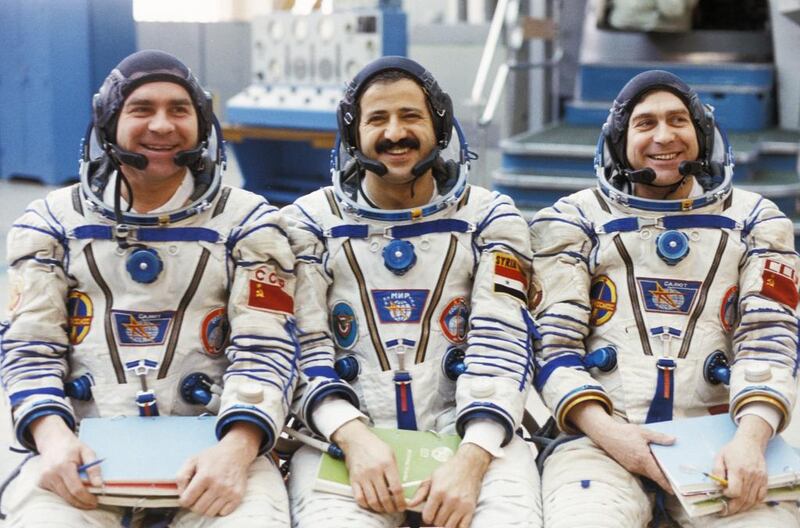On July 22, 1987, Muhammed Faris, a Syrian military aviator, made history as the first Syrian, and the second Arab, in space.
He also set another relatively unknown record.
“I brought with me a vial carrying soil from Damascus,” says the major general, who is credited with carrying the first recorded Earth dirt into space.
Speaking on the phone in an exclusive interview with The National, Gen Faris, who's from Aleppo, a city deeply embroiled in continuing conflict and destruction, now lives in Turkey with his family.
“It would take me days to describe the feeling of going up there, seeing Planet Earth, seeing Syria from above, and that sense of pride of accomplishing something historic for my country and for the Arabs,” says the 63-year-old father of four boys and one girl.
“When you go up there, you realise there are no borders, no countries, no nationalities. Just Earth. Mother Earth,” he says. “We should protect this Earth, as who hurts their mother?”
His space journey was two years after the flight into space on an American shuttle by the Saudi Prince Sultan bin Salman Al Saud, who holds the records as the first Arab, first Muslim and first royal to go into space.
“It was an era of exploration, of passion and breaking new ground,” Gen Faris says.
Fluent in Russian, he spent two years training and preparing in Moscow after being selected as part of the Interkosmos programme, a space programme designed to help the Soviet Union’s allies with manned and unmanned space missions. Then a colonel in the Syrian air force, he trained with another Syrian air force pilot, Lieutenant Colonel Munir Habib, who ended up being part of the back-up crew and did not fly into space.
“I wasn’t just a pilot; you had to be an athlete, a scientist and have the patience and stamina to endure all the special exercises and tests,” he explains.
He remembers fondly how he ended up meeting pioneer cosmonauts – as they’re known in Russia – including Alexey Leonov, who made history as the first human to “walk” in space (see the story far right).
“We were like brothers. All the cosmonauts and astronauts know each other and are one big family,” he says. “Those who have already been in space gave us advice and gave us courage to push on whenever things got hard.”
Then the day came when he, along with two Russian cosmonauts, were set to blast into space.
“You experience different types of fear: fear of never seeing your family again, fear of failing in the mission and the fear of disappointing a nation. So much goes through your mind as you are about to fly,” recalls Gen Faris, who was 35 and married with children when he flew.
But all went well for him, flying as a research cosmonaut on Soyuz TM-3 to the Mir space station. He returned to Earth aboard Soyuz TM-2 on July 30, 1987. He spent a total of seven days, 23 hours and five minutes in space.
“Mir was impressive. It was the biggest structure in space at the time,” he remembers.
Mir, travelling at an average speed of 28,783 kilometres per hour, was a Soviet/Russian-built-and-owned space station that operated in low orbit, about 400 kilometres above Earth, from 1986 to 2001, when it was deorbited.
“It was a home for all the astronauts and cosmonauts that visited it and lived on it, each leaving something behind, from books to sketches to photographs to flags, to all sorts of symbolic items from their home countries. It was cluttered with memories.”
Its name has deep meaning for Russians, translating to “world” and “peace”, as well as historical links to a village where a Russian peasant community owned its own land.
And that’s what Gen Faris felt when he was up there: “peaceful”. He says whoever goes up to space comes back a changed person.
“The way you think about life in general changes – you start thinking of the bigger picture and you don’t let the small things that happen daily bring you down,” he says. “There is an inner sense of calmness that stays with you.”
The astronaut was awarded the title Hero of the Soviet Union, and the Order of Lenin, the highest Soviet honour at that time. Other recipients from the Middle East have included the late Egyptian president Gamal Abdel Nasser.
The retired man of space waits, like hundreds of thousands of other Syrians, to go back home one day. “Whatever happens, we always have to look forward and rebuild. It is important to remember Syria for its long and rich history, its many pioneers, and how it conquered many frontiers, including the final frontier of space.”
rghazal@thenational.ae





